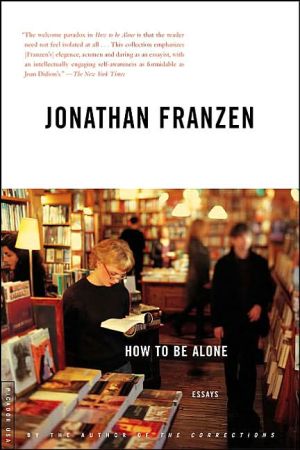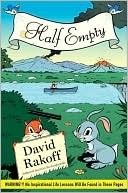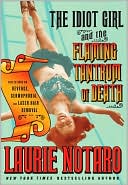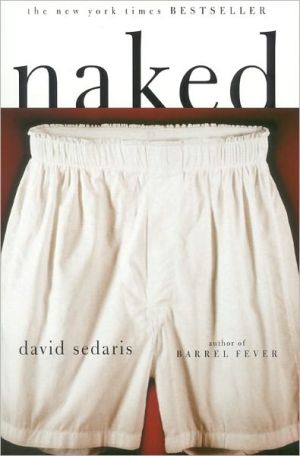How to Be Alone
From the National Book Award-winning author of The Corrections, a collection of essays that reveal him to be one of our sharpest, toughest, and most entertaining social critics\ While the essays in this collection range in subject matter from the sex-advice industry to the way a supermax prison works, each one wrestles with the essential themes of Franzen's writing: the erosion of civil life and private dignity; and the hidden persistence of loneliness in postmodern, imperial America....
Search in google:
Here, in fourteen essays, are fourteen fresh answers to the question of how to be alone in a noisy and distracting mass culture.The New York Times Book Review[Franzen] starts from the hypothesis, basic to any good novelist's inquiry, that even the simplest, most trivial activities are riven with complexities, and then proceeds, with exemplary ethical seriousness, grouchy stubbornness and silken wit, to break those complexities down into their moral, psychological and historical components.
\ A WORD ABOUT THIS BOOK MY THIRD NOVEL, The Corrections, which I’d worked on for many years, was published a week before the World Trade Center fell. This was a time when it seemed that the voices of self and commerce ought to fall silent—a time when you wanted, in Nick Carraway’s phrase, “the world to be in uniform and at a sort of moral attention forever.” Nevertheless, business is business. Within forty-eight hours of the calamity, I was giving interviews again.\ My interviewers were particularly interested in what they referred to as “the Harper’s essay.” (Nobody used the original title, “Perchance to Dream,” that the magazine’s editors had given it.) Interviews typically began with the question: “In your Harper’s essay in 1996, you promised that your third book would be a big social novel that would engage with mainstream culture and rejuvenate American literature; do you think you’ve kept that promise with The Corrections?” To each succeeding interviewer I explained that, no, to the contrary, I had barely mentioned my third novel in the essay; that the notion of a “promise” had been invented out of thin air by an editor or a headline writer at the Times Sunday Magazine; and that, in fact, far from promising to write a big social novel that would bring news to the mainstream, I’d taken the essay as an opportunity to renounce that variety of ambition. Because most interviewers hadn’t read the essay, and because the few who had read it seemed to have misunderstood it, I became practiced at giving a clear, concise précis of its argument; by the time I did my hundredth or hundred-tenth interview, in November, I’d worked up a nice little corrective spiel that began, “No, actually, the Harper’s essay was about abandoning my sense of social responsibility as a novelist and learning to write fiction for the fun and entertainment of it . . .” I was puzzled, and more than a little aggrieved, that nobody seemed able to discern this simple, clear idea in the text. How willfully stupid, I thought, these media people were!\ In December I decided to pull together an essay collection that would include the complete text of “Perchance to Dream” and make clear what I had and hadn’t said in it. But when I opened the April 1996 Harper’s I found an essay, evidently written by me, that began with a five-thousandword complaint of such painful stridency and tenuous logic that even I couldn’t quite follow it. In the five years since I’d written the essay, I’d managed to forget that I used to be a very angry and theory-minded person. I used to consider it apocalyptically worrisome that Americans watch a lot of TV and don’t read much Henry James. I used to be the kind of religious nut who convinces himself that, because the world doesn’t share his particular faith (for me, a faith in literature), we must be living in End Times. I used to think that our American political economy was a vast cabal whose specific aim was to thwart my artistic ambitions, exterminate all that I found lovely in civilization, and also rape and murder the planet in the process. The first third of the Harper’s essay was written from this place of anger and despair, in a tone of high theoretical dudgeon that made me cringe a little now.\ It’s true that, even in 1996, I intended the essay to document a stalled novelist’s escape from the prison of his angry thoughts. And so part of me is inclined now to reprint the thing exactly as it first appeared, as a record of my former zealotry. I’m guessing, though, that most readers will have limited appetite for pronouncements such as It seemed clear to me that if anybody who mattered in business or government believed there was a future in books, we would not have been witnessing such a frenzy in Washington and on Wall Street to raise half a trillion dollars for an Infobahn whose proponents paid lip service to the devastation it would wreak on reading (“You have to get used to reading on a screen”) but could not conceal their indifference to the prospect.\ Because a little of this goes a long way, I’ve exercised my authorial license and cut the essay by a quarter and revised it throughout. (I’ve also retitled it “Why Bother?”) Although it’s still very long, my hope is that it’s less taxing to read now, more straightforward in its movement. If nothing else, I want to be able to point to it and say, “See, the argument is really quite clear and simple, just like I said!”\ What goes for the Harper’s essay goes for this collection as a whole. I intend this book, in part, as a record of a movement away from an angry and frightened isolation toward an acceptance—even a celebration—of being a reader and a writer. Not that there’s not still plenty to be mad and scared about. Our national thirst for petroleum, which has already produced two Bush presidencies and an ugly Gulf War, is now threatening to lead us into an open-ended longterm conflict in Central Asia. Although you wouldn’t have thought it possible, Americans seem to be asking even fewer questions about their government today than in 1991, and the major media sound even more monolithically jingoistic. While Congress yet again votes against applying easily achievable fuel-efficiency standards to SUVs, the president of Ford Motor Company can be seen patriotically defending these vehicles in a TV ad, avowing that Americans must never accept “boundaries of any kind.”\ With so much fresh outrageousness being manufactured daily, I’ve chosen to do only minimal tinkering with the other essays in this book. “First City” reads a little differently without the World Trade Center; “Imperial Bedroom” was written before John Ashcroft came to power with his seeming indifference to personal liberties; anthrax has lent further poignancy to the woes of the United States Postal Service, as described in “Lost in the Mail”; and Oprah Winfrey’s disinvitation of me from her Book Club makes the descriptive word “elitist” fluoresce in the several essays where it appears. But the local particulars of content matter less to me than the underlying investigation in all these essays: the problem of preserving individuality and complexity in a noisy and distracting mass culture: the question of how to be alone.\ [2002]
A Word About this Book3My Father's Brain7Imperial Bedroom39Why Bother?55Lost in the Mail98Erika Imports139Sifting the Ashes143The Reader in Exile164First City179Scavenging195Control Units211Books in Bed242Meet Me in St. Louis258Inauguration Day, January 2001275
\ From Barnes & NobleFor two reasons, Jonathan Franzen was the most-discussed author of 2001. The first, of course, was the publication of his novel The Corrections, which won critics' plaudits and the National Book Award. And the second, needless to say, was Oprah Winfrey. The controversies stemming from his very brief tenure as an Oprah author reverberate still. In this eclectic collection of essays, Franzen examines not only the book club brouhaha, but maximum-security prisons, the sex-advice industry, and the persistence of loneliness in postmodern America. How to Be Alone contains Franzen's two most famous essays: the moving piece he wrote about his father's struggle with Alzheimer's disease and "the Harper essay," his incisive 1996 view of the precarious state of the American novel.\ \ \ \ \ From the Publisher\ "The welcome paradox in How to be Alone is that the reader need not feel isolated at all. . ..This collection emphasizes [Franzen's] elegance, acumen and daring as an essayist, with an intellectually engaging self-awareness as formidable as Joan Didion's." --The New York Times\ "Why be alone? For the pleasure of reading books such as this." --Entertainment Weekly\ "Franzen critiques the alienating effects of postmodern America with just as much passion as he displays in his fiction. . .he cuts to the truth with razor-sharp precision. . . These essays offer a great reason to turn of the TV and spend the evening alone, lost in thought." --Time Out New York\ "How to be Alone reaffirms the novelist's prerogative to engage in social criticism. And Franzen's calm, passionate critical authority derives not from any special expertise in criminology, neurology or postal science, but rather from the fact that, as a novelist, he is principally concerned with the messy architecture of the self." --The New York Times Book Review\ "There is here the eloquence and sensitivity and profound personal engagement that is only possible with the printed word--and, even then, only when it has no fear of being literature. Put Franzen among the living heroes of it." --The Buffalo News\ \ \ \ \ The New York Times Book Review[Franzen] starts from the hypothesis, basic to any good novelist's inquiry, that even the simplest, most trivial activities…are riven with complexities, and then proceeds, with exemplary ethical seriousness, grouchy stubbornness and silken wit, to break those complexities down into their moral, psychological and historical components.\ \ \ \ \ From The CriticsIn this wise, entertaining collection of essays, the author of the 2001 National Book Award– winning The Corrections treats a wide variety of subjects—Alzheimer's, cigarettes, rotary phones—but he's never far from his central concern, the literary life. Reprinted here is his controversial 1996 Harper's essay on the state of the novel, as well as the story of his famous disinvitation from The Oprah Winfrey Show for seeming, as she put it, "conflicted." But his most poignant (and funny) account of writing's pitfalls and pathologies is "Scavenging," about his years as a struggling fiction writer and the objects that peopled his world: "I wonder, is it possible to imagine a grimmer vision of codependency than the hundreds of hours I logged with sharp strands of copper wire squeezed between my thumb and forefinger, helping my TV with its picture?" Of his reluctance to join the Prozac-satiated multitudes with their "undepressed smiles," he notes, "I seem to myself a person who shrilly hates health." Franzen could seem shrill were his insights on modern life not so keen nor his belief in books so passionate. Author—Eric Wargo\ \ \ \ \ Eric WargoIn this wise, entertaining collection of essays, the author of the 2001 National Book Award– winning The Corrections treats a wide variety of subjects—Alzheimer's, cigarettes, rotary phones—but he's never far from his central concern, the literary life. Reprinted here is his controversial 1996 Harper's essay on the state of the novel, as well as the story of his famous disinvitation from The Oprah Winfrey Show for seeming, as she put it, "conflicted." But his most poignant (and funny) account of writing's pitfalls and pathologies is "Scavenging," about his years as a struggling fiction writer and the objects that peopled his world: "I wonder, is it possible to imagine a grimmer vision of codependency than the hundreds of hours I logged with sharp strands of copper wire squeezed between my thumb and forefinger, helping my TV with its picture?" Of his reluctance to join the Prozac-satiated multitudes with their "undepressed smiles," he notes, "I seem to myself a person who shrilly hates health." Franzen could seem shrill were his insights on modern life not so keen nor his belief in books so passionate.\ \ \ \ \ Publishers Weekly"In publishing circles, confessions of self doubt are widely referred to as `whining'-the idea being that cultural complaint is pathetic and self-serving in writers who don't sell, ungracious in writers who do." This quote, taken from his Harper's essay "Perchance to Dream," and later reworked for this collection as "Why Bother," was written before Franzen tasted huge success with his bestselling novel The Corrections. Fans of that work will be intrigued by the elements from Franzen's personal life that run parallel to those of the characters in The Corrections. However, Franzen's adroit cultural criticism, albeit a personal one, is the root of this collection of essays. Hearing such subjective work read by the author himself adds an air of authenticity. It also satisfies a curiosity as to what that voice actually sounds like. This audiobook's editors satisfy that curiosity, but also make the wise choice of not letting Franzen read the entire collection. While his reading is sincere, his delivery, unlike his text, is passionless and dry. Fortunately, the lion's share of the essays is read with much more moxie by James. He gives these intelligent, thoughtful and provocative pieces more dramatic punch than Franzen can. Simultaneous release with the FSG hardcover (Forecasts, Sept. 2). (Sept.) Copyright 2002 Cahners Business Information.\ \ \ \ \ Library JournalIn these essays, Franzen, winner of the 2001 National Book Award for Fiction, demonstrates how our materialistic culture has brought about the homogenization of society. He notes that although one might assume a black lesbian New Yorker and a Southern Baptist Georgian are very different people, in reality, owing to the influence of the mass media and powerful corporations, "both watch David Letterman every night, both are struggling to find health insurance, both play Lotto, and both have a guilty crush on Uma Thurman." From a personal and scholarly point of view, Franzen discusses such topics as our obsession with technology, the state of the novel, modern prisons, the proliferation of sex-advice books, and a scandal in the Chicago postal system. Also included is a very moving account of his father's battle with Alzheimer's disease. Although many of the works are scholarly in tone, Brian d'Arcy James's lucid, well-paced narration makes this collection accessible and interesting. Very highly recommended to all libraries.-Beth Farrell, Portage Cty. Dist. Lib., OH Copyright 2003 Cahners Business Information.\ \ \ \ \ Kirkus ReviewsOf maximum-security prisons, Dumpster diving, and privacy in a technological age: a collection of essays diverse and entertaining by the author of last year's Big Novel, The Corrections. Before The Corrections, which led circuitously to "Oprah Winfrey's disinvitation of me from her Book Club," Franzen was perhaps best known to general readers as the author of an arch, funny, and contrarian essay recounting the reasons for his "despair of the American novel," published in Harper's and thus known among the cognoscenti simply as "the Harper's essay." Revised to be still more arch and no less contrarian, if somewhat less lit-critical, the essay (now called "Why Bother?") is reason enough to fiction lovers in this increasingly "infantilizing" culture to take Franzen's nonfiction out for a spin, though it won't please the academic readers it relentlessly twits in salutary slaps such as: "The therapeutic optimism now raging in English literature departments insists that novels be sorted into two boxes: Symptoms of Disease (canonical work from the Dark Ages before 1950) and Medicine for a Happier and Healthier World ("the work of women and of people from nonwhite or nonhetero cultures"). The other essays, most previously published in Details, the New Yorker, and elsewhere, deliver sufficient bang for the book, though none quite stands up to the centerpiece. Some of them, such as a perceptive study of the Post Office at work, manage to be quite timely even as they bear a few signs of age; others get a little weird, as when Franzen observes that smoking cigarettes serves, at least in his case, "to become familiar with apocalypse, to acquaint myself with the contours of its terrors, to make theworld's potential death less strange and so a little less threatening." None, however, is predictable, and all bear Franzen's trademark sensibility of smiling, even though scared silly, in the face of doom. Smart, solid, and well-paced: a pleasure for Franzen's many remaining admirers.\ \








